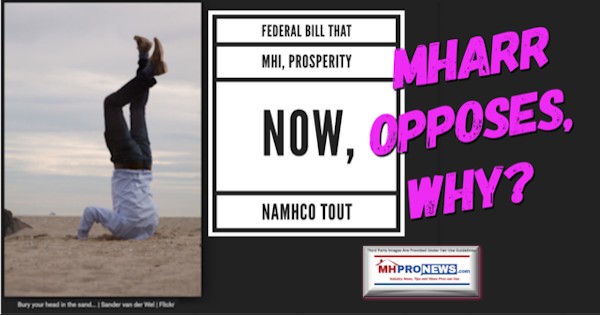
Last week, the Daily Business News on MHProNews published a multiple perspective report on a bill that NAMHCO, MHI, and Prosperity Now have all come out in support of, which can be accessed via the text/image box below.
Against that backdrop, earlier this week, the Manufactured Housing Association for Regulatory Reform provided MHProNews their analysis on this measure. It follows below.

JUNE 24, 2019
TO: MHARR MANUFACTURERS
MHARR TECHNICAL REVIEW GROUP (TRG)
MHARR STATE AFFILIATES
FROM: MHARR
RE: UNNECCESSARY/DAMAGING BILLS INTRODUCED IN CONGRESS
MHARR, based on numerous inquiries from industry members, has conducted a study and investigation of parallel bills introduced in the Senate and House of Representatives, entitled the “HUD Manufactured Housing Modernization Act of 2019.” The Senate version of the bill – S. 1804 – was filed on June 13, 2019. The House version – H.R. 926 – was filed in the current Congress on January 30, 2019, but was previously introduced by the same sponsor, Rep. Norma Torres (D-CA), in 2017 and has been closely monitored by MHARR since that time.
In MHARR’s opinion, while seemingly innocuous on their face and apparently well-intended by their respective congressional sponsors, these bills — being pressed behind-the-scenes by narrow special interests, both within and outside of the industry – are not only unnecessary, but could have profoundly damaging unintended consequences for both the mainstream HUD Code manufactured housing industry and the lower and moderate-income American families who rely on those mainstream manufactured homes as the nation’s premier source of affordable, non-subsidized homeownership. Indeed, if enacted into law (in either the House or Senate form), these bills could ultimately undermine and destroy all of the gains, advancements, recognition and acceptance that the industry (and consumers) have achieved under the Manufactured Housing Improvement Act of 2000 and the reforms within that law designed to transition manufactured homes from the “trailers” of yesteryear to modern, legitimate “housing” for all purposes.
And, in fact, it is because of the reforms mandated by the 2000 law, that recognition and acceptance of manufactured homes and the manufactured housing industry has become the norm among decision-makers in the nation’s capital, as demonstrated particularly (but not exclusively) by HUD Secretary Ben Carson’s accolades for manufactured housing as a major part of the solution to the nation’s affordable housing crisis. As explained below, however, these bills, if enacted, would: (1) undermine the progress that mainstream, affordable, HUD Code manufactured homes have made in Washington, D.C.; (2) would split the industry into a class of “high-end” homes and ade facto “second class” of mainstream, affordable homes that would once again be re-relegated to “trailer” status; and (3) effectively exclude such mainstream, affordable, HUD Code manufactured homes from any consideration for, or participation in, housing programs sponsored by the federal government – all for the benefit of a handful of corporate conglomerates.
Specifically, these bills — in light of recent developments concerning the Duty to Serve Underserved Markets (DTS) and the apparent effort by Fannie Mae and Freddie Mac, promoted by some in the industry, to divert DTS support to a supposed “new class” of pseudo-manufactured homes while providing no support whatsoever to existing, mainstream manufactured homes financed through personal property loans — appears to be tailored not only to legitimize the so-called “new class” of pseudo-manufactured home, but also to mandate government support for the utilization of that new class of home. The legislation, consequently, if enacted, would legally validate the discriminatory DTS policies adopted by Fannie Mae and Freddie Mac and the establishment of two separate “classes” of “residential manufactured homes” — the new class of high-cost, site-built-like hybrid homes favored and prioritized for securitization and secondary market support by Fannie Mae and Freddie Mac on the one hand, and a “second class” comprised of existing, affordable, mainstream HUD Code manufactured homes on the other, with continued and worsening discrimination against the “second-class” of mainstream manufactured homes.
The legislation, if enacted, would thus sanitize and institutionalize the diversion of DTS support from mainstream manufactured housing to this so-called “new class” of home. It would also simultaneously pave the way for local jurisdictions to utilize this “new class” of home – while in many, if not most cases, continuing to exclude and discriminate against mainstream, affordable HUD Code manufactured housing — in order to access HUD grants and other funding. The bills do this through a two-step process of effectively expanding the definition of “manufactured home” currently contained in federal law and then requiring the inclusion of homes meeting this expanded definition in the “Consolidated Plans” that jurisdictions must submit to HUD in order to receive federal funding under multiple HUD programs.
In relevant part, the bills direct HUD to “issue guidelines for jurisdictions relating to the appropriate inclusion of residential manufactured homes in a Consolidated Plan of the jurisdiction.” (Emphasis added). The term “Consolidated Plans,” as noted above, refers to “comprehensive housing affordability strategy and community development plans” required by HUD regulations for communities seeking federal funds under HUD’s formula grant programs, including Community Development Block Grants (CDBG) among many others. The definition of “residential manufactured home” contained in the bills, in turn, while referring to the definition of “manufactured home” contained in the National Manufactured Housing Construction and Safety Standards Act of 1974, as amended by the Manufactured Housing Improvement Act of 2000, would nevertheless expand that definition by using the term “residential,” which is not contained or included in the existing federal law definition. The Senate bill, in addition refers to homes ‘used as a dwelling,” which differs from existing law which defines “manufactured homes” as being “designed to be used as a dwelling.” The bills, accordingly, would create a discrepancy between the existing definition of “manufactured home” and what does – or does not – constitute a “residential manufactured home,” potentially without any type of vetting, analysis or due consideration, that would elevate the so-called “new class” of home for use in every jurisdiction receiving HUD grants and other funding, while reducing mainstream, affordable HUD Code manufactured homes, once again, to second-class “trailer” status contrary to the 2000 reform law.
The bills, accordingly, pose a significant threat to existing, affordable, mainstream HUD Code manufactured housing and the lower and moderate-income families that rely upon those homes. At a minimum, with their expanded definition of “residential manufactured home,” which is materially different from the definition already contained in federal manufactured housing law, the two bills, if enacted, would create immediate market confusion – particularly for existing HUD Code manufactured homes, homeowners, and purchasers that could further suppress the mainstream, affordable HUD Code market — and could lead to liability and litigation over just what does or does not constitute a “manufactured home” for purposes of federal regulation and a multitude of other issues. Consequently, MHARR does not and cannot support these bills and has already begun efforts in Congress (and at HUD) to expose the significant problems inherent in these bills and the major harm that they could – and likely would — cause for both consumers of mainstream, affordable manufactured housing and the industry as a whole, but especially its smaller businesses.
Again, and in summary, these bills are unnecessary and potentially harmful, in that they:
- Would perpetuate a negative connotation and image of existing, mainstream, HUD Code manufactured housing through their identical titles, which imply that manufactured homes are in need of “modernization” notwithstanding the sweeping institutional reforms of the Manufactured Housing Improvement Act of 2000. In addition, these titles are misleading and inaccurate, in that the HUD program and the legal treatment of manufactured housing itself were already “modernized” by the 2000 reform law, after input from all stakeholders and the National Commission on Manufactured Housing;
- Would, by changing the definition of what constitutes a “manufactured home,” create a substantial risk that the so-called “new class” of manufactured homes could lead to the establishment of a new baseline for all federal manufactured home standards, which would destroy the fundamental affordability of manufactured homes;
- Would — even if it does not lead to more expansive and costly federal standards, as above — re-relegate existing, mainstream, affordable HUD Code manufactured homes to second-class “trailer” status;
- Would undermine gains and advances made through and as a result of the Manufactured Housing Improvement Act of 2000 to elevate the status of mainstream, affordable manufactured homes to that of legitimate “housing” for all purposes (including federal and federally-sponsored housing programs);
- Would legitimize and institutionalize continuing discrimination against mainstream, HUD Code manufactured home personal property loans under DTS;
- Would legitimize and reinforce the discriminatory exclusion of mainstream, affordable HUD Code manufactured homes in jurisdictions seeking HUD grants and other related funding by effectively directing those jurisdictions instead to higher-cost, “new class,” hybrid-type homes;
- Would direct HUD funding and grants to jurisdictions that continue to discriminate against and exclude mainstream, affordable HUD Code manufactured homes and manufactured housing residents;
- Would create immediate market confusion, would further suppress the existing HUD Code manufactured housing market and depreciate the re-sale value of such mainstream, affordable manufactured homes;
- Would benefit just a handful of industry conglomerates at the expense of smaller, independent industry businesses and the lower and moderate-income American homebuyers who rely on the affordability of mainstream HUD Code manufactured housing.
Consequently, rather than these bills, with their inconsistent language and potentially devastating consequences for mainstream, affordable HUD Code manufactured housing, MHARR will instead seek to advance language that could be included in any moving bill involving HUD or housing finance that would ensure equal, non-discriminatory treatment for all HUD Code manufactured housing in both HUD housing and community grant programs, and housing finance programs under the jurisdiction of HUD (i.e., the Federal Housing Administration and Ginnie Mae) and/or the Federal Housing Finance Agency (i.e., Fannie Mae and Freddie Mac). It is worth noting that under the 2000 reform law, manufactured housing producers have – and have always – been capable of building homes with additional upgrades and features. Thus, the MHARR-suggested language below.
That language, which MHARR has already started to provide to Congress, states:
- “The Secretary of Housing and Urban Development shall provide for the inclusion of manufactured homes in all housing, federal housing assistance and community development programs and activities, including community development grants, administered by the Department, and shall ensure that any jurisdiction participating in any such program or applying to participate in any such program does not exclude or unreasonably restrict the placement of manufactured homes as defined by and regulated pursuant to the National Manufactured Housing Construction and Safety Standards Act of 1974, as amended by the Manufactured Housing Improvement Act of 2000 (42 U.S.C. 5401, et seq.) within that jurisdiction.”
- “The Federal Housing Finance Agency shall ensure that the Government Sponsored Enterprises provide securitization and secondary market support for loans to purchase manufactured homes regulated pursuant to the National Manufactured Housing Construction and Safety Standards Act of 1974, as amended by the Manufactured Housing Improvement Act of 2000 (42 U.S.C. 5401, et seq.), including loans secured by manufactured homes titled as real estate and manufactured homes titled as personal property, on an equal basis with all other types of single-family homes.”
Such language, attached to any moving bill in Congress, would propel parity and equality between existing, mainstream, affordable HUD Code manufactured housing and all other types of housing, while simultaneously prohibiting discrimination against HUD Code housing (and manufactured homeowners) in vital areas. By contrast, when the innocuous veneer of the pending bills is stripped away, it becomes apparent that they would do serious harm to existing, mainstream HUD Code manufactured housing and the lower and moderate-income American families who rely on the non-subsidized affordability of those homes. Indeed, a thorough analysis, based on accurate and factual information, shows that congressional (and Administration – i.e., HUD) goodwill toward the industry is being diverted instead toward the benefit of extremely narrow special interests. As a result, these bills should be unacceptable to the industry at large. MHARR, for its part, will continue to disseminate accurate and factual information to educate and inform Congress, the Administration and other decision-makers of the potentially serious market disruptions that could result from such legislation, and how the positive and constructive intent of Congress toward mainstream, affordable HUD Code manufactured housing can best be advanced through the above language.
Please let us know if you have any questions or need any additional information regarding this matter. We will continue to keep you apprised as new developments unfold.
cc: Other Interested HUD Code Industry Members
Manufactured Housing Association for Regulatory Reform (MHARR)
1331 Pennsylvania Ave N.W., Suite 512
Washington D.C. 20004
Phone: 202/783-4087
Fax: 202/783-4075
###
MHProNews has contacted legislators on both sides of the political aisle about this piece of legislation. There were polite, professional assurances made that our concerns would be reviewed and addressed. Stay tuned.
It should also be noted that MHProNews and our parent company has provided input and content from sources that we may agree, disagree, or have a nuanced ‘wheat and chaff’ interest in. We have sources that we may or may not agree with, but if their perspective is of importance to the industry’s professionals, we routinely opt to share it.
We have at times held positions that are different than that of a sponsor or client. No two people or organizations hold the same vantagepoint on every issue. Nor should it be expected. It would be contrary to human nature and experiences. We don’t expect a sponsor to agree with everything we say or do, and the same is true in reverse.
Perhaps the most dramatic example of that is the Manufactured Housing Institute (MHI), Clayton Homes, and 21st Mortgage Corporation. Each of them were sponsors. We took periodic positions that were different than theirs. Then MHI Chairman Tim Williams praised our objectivity, which he said made our support – when they had it – all the more valuable.
That was arguably the right stuff thinking.
Manufactured housing is in an 8-month slide. Some sources with MHI tell us that we should expect an uptick that reveres that trend. We will soon see.
What is certain is that MHI, Clayton, and the ‘powers that be’ in the industry, plus their surrogates, act as if all is well. Unless the goal is to throttle the industry and consolidate it at a discount, who can say all is well with a straight face? See the report below.
Open Letter – Kurt Kelley, Joanne Stevens, Frank Rolfe, Manufactured Housing Review About Senator Elizabeth Warren’s Request For Information from Manufactured Home Community Owners – manufacturedhomelivingnews.com
Kurt Kelley, JD, is the publisher of the Manufactured Housing Review ( MHR), as the below reflects in his quarterly’s ” Publisher’s Message.” For the 2019 Quarter 1 issue, his message read in part as follows. [in this issue] address Senator Elizabeth Warren’s attempt to gather private information from Manufactured Home Community owners.
That’s today’s first chapter of manufactured home “Industry News, Tips, and Views Pros Can Use,” © where “We Provide, You Decide.” ©. ## (News, fact-checks, analysis, and commentary.)


1) Marketing, Web, Video, Consulting, Recruiting and Training Resources
Submitted by Soheyla Kovach to the Daily Business News for MHProNews.com. Soheyla is a managing member of LifeStyle Factory Homes, LLC, the parent company to MHProNews, and MHLivingNews.com.
Related Reports:
You can click on the image/text boxes to learn more about that topic.
MHARR Reiterates Call for DTS Investigation | Manufactured Housing Association Regulatory Reform
Washington, D.C., June 18, 2019 – The Manufactured Housing Association for Regulatory Reform (MHARR), in a June 13, 2019 communication to Fannie Mae Vice President Jonathan Lawless (copy attached), has reiterated its call for a congressional investigation into the failure of both Fannie Mae and Freddie Mac to implement the statutory Duty to Serve Underserved …
MHARR Calls on HUD Secretary to End Discriminatory And Exclusionary Zoning of HUD-Regulated Manufactured Homes | Manufactured Housing Association Regulatory Reform
Washington, D.C., April 30, 2019 – The Manufactured Housing Association for Regulatory Reform (MHARR) in an April 24, 2019 communication to U.S. Department of Housing and Urban Development (HUD) Secretary, Ben Carson (copy attached), has called on the Department to federally preempt local zoning ordinances which discriminatorily exclude manufactured homes regulated by HUD pursuant to the National Manufactured Housing Construction and Safety Standards Act of 1974 and the Manufactured Housing Improvement Act of 2000.

























